|
TRUE HOLLYWOOD STORIES
A Family Thing One often reads in the biographies of writers what precocious little tykes they were, how they were reading Homer in the original Greek at four and at five, Finnegans Wake, but such wasn’t the case with me. My taste was resolutely low-brow when I was a kid. We called comic books funny books in Arkansas, and I was known to the other kids as the Funny Book King (also the Firecracker King, but that’s a different story). I had stacks and stacks of funny books (they’d probably be worth a fortune now, but--and this seems to be a sadly common story--my mother threw them away, along with all my Famous Monsters of Filmland magazines, when I went off to college [“Mom! What have you done?” “Well, honey, they were just a bunch of ragged old funny books.”]). One of my favorite funny book heroes was Sergeant Rock, who killed Germans by the dozen in every issue. Sergeant Rock was fond of saying: “Nothing’s ever easy in Easy Company.” And that’s what I’ve always thought about Hollywood. It’s never easy. It’s always a battle. There’s always blood on the walls. Except one time it was different. In 1994, Billy and I were represented by Todd Harris of the William Morris Agency. We were excited when Todd signed up a new client, one of our favorite actors, Robert Duvall, and were eager to be put together with him. Duvall hadn’t seen the movie we’d written, One False Move, so Todd gave him a copy. Duvall liked it, and it was arranged for us to meet him and Brad Wilson, who ran his production company, at the Four Seasons Hotel. Duvall--or “Bobby,” as everyone called him-- had the seed of an idea for a movie. It was actually a rather unlikely idea. Bobby, who with his fair skin and blue eyes is about as Anglo as you get, wanted to play a man who was half black. So Billy and I went away and cooked up a story and a couple of weeks later pitched it to Bobby. An Arkansas redneck named Earl discovers after the death of his mother that she wasn’t his real mother. A black woman who’d been the family’s maid had been raped by Earl’s father and then had died giving birth to him. Earl also finds out he has a black half brother living in Chicago. Bobby liked the idea. We took it to United Artists and pitched it to its president, John Calley. Calley, one of the classiest people in Hollywood, also liked it. We were hired to write the script. We wrote it. We turned it in. Everyone liked it. The notes we received were smart, and minimal. The script was given to a director, Richard Pearce. Billy and I met with him at our favorite hangout, Outlaws in Playa del Rey. Dick liked the script. We liked Dick. Dick was hired. UA gave A Family Thing a greenlight. There were some anxious moments when the first two actors who were offered the role of Ray, Earl’s half brother, turned it down, but then James Earl Jones said yes to it, and eventually everyone realized he’d been the best choice all along. Many, maybe most, directors who aren’t writers themselves feel threatened by writers and don’t really like having them around. This is probably because of the preposterous fairy tale put forward by decadent Frenchmen called “the auteur theory,” which sees the director of a movie as equivalent to the author of a book. The screenplay, according to this way of thinking, is a mere blueprint that the director uses to bring his unique creative vision to life (Tell me something: Who would you consider the “author” of a building? The foreman who oversees the construction? Or the architect who designs the blueprints?). At any rate, Dick Pearce wasn’t like that. He took me on location scouts. I sat in on rehearsals with the actors. And then, when the movie was shot in the late-spring and summer of 1995 in Memphis and Chicago, I was there. John Calley and his colleague at UA, Rebecca Pollack, trusted the filmmakers and left them alone to make their movie. The results were a film that all involved with continue to be very proud of. As Sergeant Tom says, once in a blue moon, it’s actually easy in Easy Company. |

